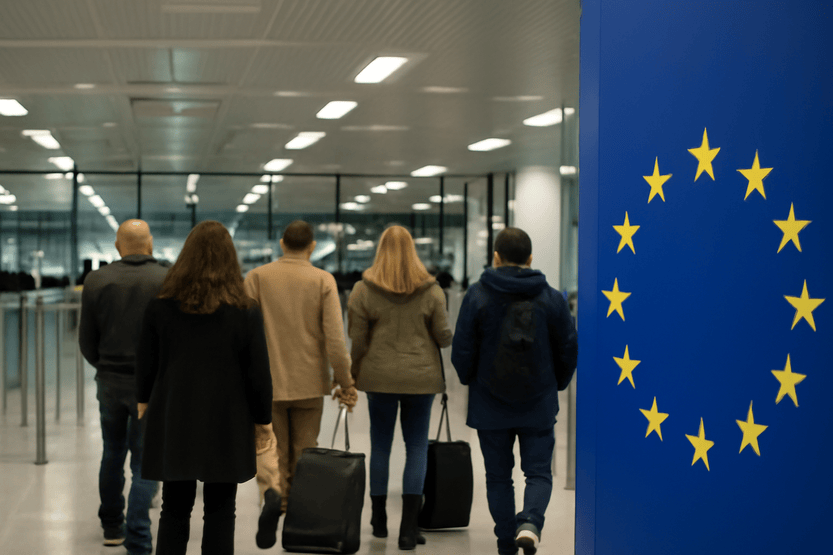Home » EUROPE » Brexit Looming Impact on Tourism: Stricter EU Border Controls and Economic Uncertainty to Disrupt Travel
Published on
September 20, 2025
The UK is facing growing economic and political challenges, from concerns over rising joblessness to difficulties in housing, education, and growth. Professor Anand Menon, a renowned expert in European politics, highlights that Brexit, compounded by global instability, will increase the difficulty of travel to the EU. The EU’s new Entry-Exit System (EES), set to launch in October 2025, is expected to create further chaos for UK travellers, especially those entering the EU for the first time.
Under the EES, all individuals entering the EU will be required to provide biometric data, including fingerprints. This system will add to the already complicated travel process and could lead to long delays at the border. For travellers who have grown accustomed to the relatively smooth processes prior to Brexit, this will be a significant disruption. The changes are expected to impact the travel plans of millions of tourists and could put a strain on the tourism sector, particularly in destinations that rely heavily on UK visitors, such as Spain and France.
The Strain on Tourism in Key EU Destinations
Tourist destinations such as Mallorca, Ibiza, and Barcelona are likely to feel the effects of these changes the most. These regions, known for their popularity among UK tourists, could face declining numbers if delays at EU borders become more frequent. The uncertainty surrounding border control measures could discourage tourists from making their annual trips, resulting in a decline in bookings for flights, accommodations, and tours.
The uncertainty surrounding the UK’s economic situation only adds fuel to the fire. As inflation and political instability weigh on the UK’s economy, fewer people may be willing or able to travel to Europe, fearing both the cost and hassle involved. For businesses in the tourism sector, especially those in popular destinations like Spain and Italy, the looming spectre of Brexit-related disruptions presents a real threat to their bottom line.
EU’s Economic and Political Struggles
Brexit’s impact on UK-EU relations goes beyond just travel. The European Union itself is grappling with its own set of challenges. Populism is on the rise in several EU countries, including France, Germany, and Italy, where economic issues have begun to stir political instability. According to Professor Menon, this is causing difficulties in navigating crucial issues like defence spending and budget negotiations. For tourists, this means that the stability once offered by EU membership is becoming increasingly difficult to rely on.
These internal EU struggles, coupled with the new entry requirements, create a storm of uncertainty for travellers. The additional bureaucratic hurdles only make travelling to the EU more challenging, discouraging tourists who would have otherwise visited Europe. Many travellers may seek alternative, more accessible destinations, diverting their attention from EU countries.
Brexit’s Long-Term Effects on UK-EU Travel Relations
Despite the diplomatic efforts of UK leadership, especially under Keir Starmer, Professor Menon believes that Brexit’s “bare bones” will continue to shape the relationship between the UK and the EU. While there have been some improvements in agriculture and emissions agreements, these changes do not remove the fundamental constraints that Brexit has imposed on the UK’s ability to form closer ties with the EU.
This makes it challenging for the UK to regain a foothold in Europe’s tourism market. If these border issues persist, it could lead to long-term declines in UK tourists travelling to Europe, particularly for short getaways. The added complexity of entering the EU could make European destinations less appealing for travellers looking for a seamless and hassle-free vacation experience.
The Future of UK-EU Tourism
The outlook for UK-EU tourism remains uncertain, but the early signs suggest that travel will become more cumbersome and less predictable. The EU’s new entry system is only the beginning, and as these new regulations take effect, UK tourists may find themselves facing longer wait times and more paperwork. This added friction in the travel process could drive tourists to consider alternative vacation spots outside of Europe.
While some experts, like Professor Menon, express hope that the relationship between the UK and the EU could improve in the future, the immediate aftermath of Brexit and the new border regulations will likely cause continued disruptions in the tourism industry. The UK’s economic and political turmoil adds another layer of complexity, making travel to Europe a more daunting prospect for many.
The Ongoing Struggles for UK-EU Tourism in a Post-Brexit World
The impact of Brexit on UK-EU tourism is expected to intensify in the coming years. Stricter border controls, the EU’s new Entry-Exit System, and ongoing economic uncertainty will continue to hamper travel, making it more difficult for UK tourists to visit popular European destinations. These challenges could lead to a decline in tourism numbers, affecting the economies of both the UK and EU countries that rely heavily on UK visitors. As the travel industry adjusts to these changes, it is clear that Brexit will remain a significant headache for the tourism sector for years to come.
